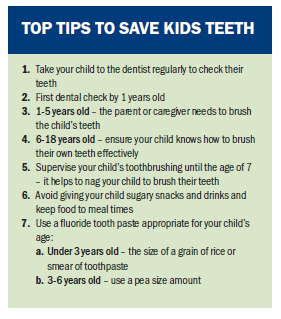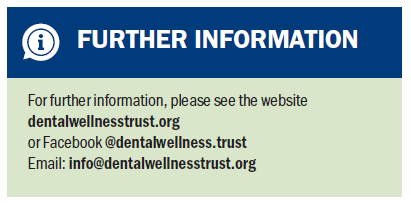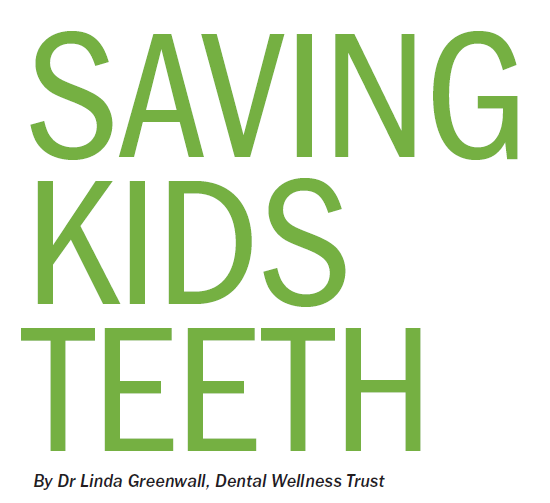The recent news articles highlighting the plight of 48,000 children living in England having to go into hospital to have their rotten teeth extracted under a general anaesthetic has shocked many people. How could this be? With a sophisticated National Health Service providing dental treatment at no charge for kids – how did this situation arise?
 What are the factors leading up to this? Why are the numbers of children being admitted into hospital increasing and what can be done about this? The Dental Wellness Trust (DWT), a charity established in 2011, has launched a campaign to highlight the plight of these children and to roll up their sleeves and do something about this. The DWT is evaluating strategies to reduce the numbers of children suffering from such severe decay and help limit the number of hospital admissions for tooth extractions.
What are the factors leading up to this? Why are the numbers of children being admitted into hospital increasing and what can be done about this? The Dental Wellness Trust (DWT), a charity established in 2011, has launched a campaign to highlight the plight of these children and to roll up their sleeves and do something about this. The DWT is evaluating strategies to reduce the numbers of children suffering from such severe decay and help limit the number of hospital admissions for tooth extractions.
In some cases, it is tragic to report that all the child’s baby teeth need to be removed. The term is called a clearance of all their rotten teeth i.e. all the child’s primary teeth being extracted. This is a significant event for a 4 year old and for any child. Not only is there the trauma of being admitted into hospital for the child, but also for the child’s parents. To be present when your child is having a general anaesthetic is distressing, especially when the child wakes up from the anaesthetic and their mouth is bleeding and unable to eat (apart from a soft diet) as they now have no teeth. What’s more, these types of childhood traumas can affect adult oral health and create dental phobias for life.
What are the strategies that can change this? How can we make a difference and shape statistics and lives for the better? That is our mission. We have campaigned for improvement and looked at aspects that can make a real difference. However, this needs a co-ordinated team approach from sugar reduction programmes, oral health programmes and social care.
What are the issues?
 Diet, including the over consumption of sugary drinks, hidden sugars and junk food are all contributing significantly to tooth decay. Poverty is also an issue in many places of the UK. Often families have no toothbrushes, very little or no food and there is a breakdown of the family structure. Parents are dealing with their own issues and may be too tired to supervise their children’s brushing. There is no focus on oral health for the whole family. There is lack of education on the importance of saving children’s teeth, lack of education on how to care for children’s teeth and lack of a perceived need to preserve primary teeth as these milk teeth fall out and new teeth will erupt. So, is it dental neglect to give your child sweets that you know will cause their teeth to rot or to feed children a high sugar diet with no focus on brushing teeth? It’s also about educating parents and carers who want to learn how best to attain oral health for their children. Decay can develop rapidly in a mouth that is not brushed or without the correct interventions such as varnish programmes and fissure sealant programmes.
Diet, including the over consumption of sugary drinks, hidden sugars and junk food are all contributing significantly to tooth decay. Poverty is also an issue in many places of the UK. Often families have no toothbrushes, very little or no food and there is a breakdown of the family structure. Parents are dealing with their own issues and may be too tired to supervise their children’s brushing. There is no focus on oral health for the whole family. There is lack of education on the importance of saving children’s teeth, lack of education on how to care for children’s teeth and lack of a perceived need to preserve primary teeth as these milk teeth fall out and new teeth will erupt. So, is it dental neglect to give your child sweets that you know will cause their teeth to rot or to feed children a high sugar diet with no focus on brushing teeth? It’s also about educating parents and carers who want to learn how best to attain oral health for their children. Decay can develop rapidly in a mouth that is not brushed or without the correct interventions such as varnish programmes and fissure sealant programmes.
Severe tooth decay in children could be a symptom of wider neglect, experts warn. Children found to have severe dental decay should be referred to NHS safeguarding teams because it may be an indicator of wider neglect at home. Researchers Schlabe et al (2018) at King’s College Hospital in London said untreated tooth pain should “ring alarm bells” for any clinician. The team discovered that 40% of children who needed dental or maxillofacial surgery due to dental decay were known to social services. The findings have led to a new process at King’s College Hospital A&E unit for children admitted with dental infections, which sees them assessed for child neglect and referred to a safeguarding team if necessary. Dr Kathy Fan stated, “Sadly, by the time we treated the children they would already have suffered a sustained period of oral neglect, and probably been in pain”. The study authors said they want to see the changes rolled out across the NHS. They also suggest that all children who are made subject to a child protection plan by social services should have a dental assessment carried out.
BBC Breakfast also highlighted the findings from the same study and featured an interview with paediatric dental consultant, Claire Stephens from the British Society of Paediatric Dentistry. She said that she sees children daily at the more severe end, but where there are concerns she said these would be referred to a specialist team in the hospital where she works. She said that dentists are trained in safeguarding since 2009 and emphasised the importance of supporting parents to look after their children’s dental health and brushing teeth twice daily with fluoride toothpaste. The Dental Wellness Trust has introduced toothbrushing programmes into schools across London and Luton to help reduce this burden of dental decay. They are now looking for more schools and nurseries to participate in their Live Smart Toothbrushing programmes.
About the Dental Wellness Trust
The Dental Wellness Trust was founded by Dr Linda Greenwall, a dentist practicing in Hampstead. She decided it was time to give back to help the millions of children who do not have access to a toothbrush or the knowledge on how to brush. Linda soon discovered that this is a massive global issue which needs addressing – especially in all countries where there is poverty. She has established an oral health programme called the Live Smart Programme where the children gather daily to wash their hands thoroughly and brush their teeth in the correct efficient manner. The children are educated by a group of oral health champions called Toothbrush Mamas. In South Africa, they reach 10,000 kids a day in Cape Town and 3,000 children in Johannesburg who live in the poorest townships. These kids live in tin huts
and informal settlements with no running water or heating. There are 44 toothbrush mamas who sustain the programme daily and they have also established an evening programme where the kids meet at the home of their supervisor, wash their hands and brush their teeth daily. The knowledge and experience that has been gained from their innovative programmes have been introduced into the UK into schools and nurseries.
Recently the Dental Wellness Trust spoke about their programmes at the Level Trust Poverty Conference and teachers approached them to ask to introduce a toothbrushing programmes into their school. This was implemented at the beginning of the year following a teachers’ training programme. We start with teaching the teachers how to brush their own teeth. No one ever has a formal lesson on how to brush their teeth effectively, yet we do this twice a day. The teachers and the children have enjoyed the programme and this has now expanded to other areas. The children learn the correct and effective way to brush their teeth. This is also an inclusive group activity and a fun toothbrushing song is played for two minutes while the children brush. In other communities, the children learn other toothbrushing songs to add to the enjoyable experience and positivity of brushing their teeth. Following the establishment of the supervised toothbrushing programme, the benefits have been significant. There has  been a difference in the reduction of dental disease, improvement of oral health and hygiene as well as a sense of overall wellness among the children and their communities. If both their teeth and hands are feeling clean, they feel a real accomplishment. Taking responsibility of your own health is the key.
been a difference in the reduction of dental disease, improvement of oral health and hygiene as well as a sense of overall wellness among the children and their communities. If both their teeth and hands are feeling clean, they feel a real accomplishment. Taking responsibility of your own health is the key.






